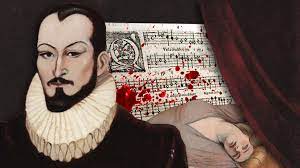Carlo Gesualdo, Prince of Venosa, was an Italian composer and nobleman born on March 8, 1566, in Venosa, a small town in the Kingdom of Naples. He is primarily known for his innovative and highly expressive madrigals and sacred music, but his life was marked by a complex and controversial personality.
Gesualdo hailed from a prestigious and wealthy family, inheriting the title of Prince of Venosa at a young age. His early education included music, and he displayed a keen interest and talent for the art. In 1586, he married his cousin Maria d’Avalos, a union that would later become infamous due to its tragic outcome.
Despite his noble status, Gesualdo’s life was tumultuous. Known for his mercurial temperament, he was implicated in several scandals and violent incidents. However, his most notorious act occurred in 1590 when he discovered his wife in an affair with another man. In a fit of jealousy and rage, Gesualdo murdered both his wife and her lover, a crime that would haunt him for the rest of his life.
Following this tragic incident, Gesualdo withdrew from public life to his castle in Gesualdo, dedicating himself more intensely to music composition. His works are characterized by a bold and avant-garde harmonic language, pushing the boundaries of Renaissance music. He experimented with dissonance and chromaticism, creating intense and emotionally charged compositions.
Gesualdo’s six books of madrigals, published between 1594 and 1611, showcase his unique approach to musical expression. The dissonant harmonies and dramatic text painting found in his madrigals were centuries ahead of their time, influencing later composers such as Igor Stravinsky and Arnold Schoenberg.
In addition to his madrigals, Gesualdo composed sacred music, including responsories, motets, and sacred madrigals. His sacred works are characterized by their emotional intensity and deep spirituality.
Despite the controversy surrounding his personal life, Gesualdo’s musical legacy has endured through the centuries. His contributions to the development of Western music, particularly his avant-garde harmonic language, continue to be studied and appreciated by musicians and scholars alike. Carlo Gesualdo, the tormented prince and groundbreaking composer, left an indelible mark on the history of music.


Comments are closed